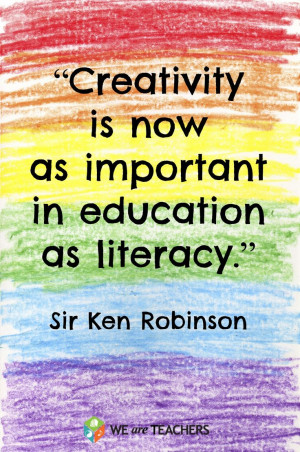A couple of months ago I sat among superintendents and curriculum teams listening to Yong Zhao passionately discuss the need to recreate our educational paradigm. Watch the YouTube video below and think about his message. Every child is Rudolph with unique talents and strengths. How can we embrace these strengths, so a shiny red nose is seen as a gift versus an imperfection? As I mentioned in a recent blog post, 20% of students have dyslexia. These students are gifted in their own way, viewing the world through a unique lens. How can we look at education differently where every student realizes their creative genius?
Out of Basement Ready
Yong Zhao quips, “our students need to be out of basement ready.” What does that mean? Our educational system needs to ensure students have the necessary skills, so they aren’t graduating from college and living in their parents’ basement due to unemployment. He asserts that we should stop fixing the past and invent the future by enhancing students’ strengths, unleashing their creativity and entrepreneurial spirit. Technology catapulted us into a creative economy filling our lives with ubiquitous information and methods for learning – all at our fingertips, available anytime, anywhere. The only true barrier is internet access and a device to access it.
My son hardly fit the mold of a “great” student, if you ask some teachers (or him, for that matter) from his past. However, he’s a great writer, basketball player, and makes connections with anyone he meets. He’s been studying basketball for years, primarily on YouTube. Our cell phone bill supports this considering he uses 17 GB of data per month. My average is 2 GB! The point is, students do take charge of their learning, but it often happens after they leave school. If we allow their passion to bleed into the school day, how much more interested would they be? Recently, I asked my son what he wants to do after graduation, and he said, “Be an NBA scout.” Awesome. I believe he can. We discussed ways of showcasing his talent and hopefully, very soon, he’ll be blogging about what he sees when he watches a basketball game. His talents are unique; what he sees on a basketball floor and in players sets him apart, and he knows many NBA players. If he can infuse his writing with his basketball IQ, he might create a job for himself. The network he built since he was eight years old will offer immeasurable value as he reconnects in his professional life. He will be “out of basement ready.”
We don’t need to continue to fix the past but invent the future. -Yong Zhao
 Embracing Creativity
Embracing Creativity
A few weeks ago, Anita Hughes, one of our elementary gifted teachers, asked me to judge Shark Tank. Students were to “pitch” their invention in front of three judges, most of which were from local businesses. Everyone participating in the event was in the gifted program. Some of the ideas were amazing. I sipped on a new sports drink made with coconut water and orange juice that was substantially healthier than Gatorade. A gadget that kept children from being left in a hot car, measuring the internal temperature of the car had real value. A meal that replaced Lunchables with healthy alternatives, yet cost effective made me smile. Idea after idea – yes! What I would love to see is all students having this opportunity. Don’t forget, two of the five sharks on ABC’s Shark Tank have dyslexia. Kevin O’Leary failed so often when he was young; he worried he wasn’t going to make it in school. What would a Shark Tank-style opportunity have done for him in school? Providing opportunities for students to enhance their strengths as mentioned by Yong Zhao can instill a love of learning. The students participating in Shark Tank weren’t simply inventing; they were learning how to pitch an idea, supporting their idea with detailed analysis, creating budgets, profit margins, marketing materials, and prototypes. It is a cross-curricular activity that’s fun and engaging tapping into their creative genius. In life, they will use each of those skills, frequently. How can these students take their inventions to the next level? I hope they continue pursuing the ideas pitched that day.
Last year, Wilson Elementary launched their first Student-Led Google Conference where students hosted sessions and students and teachers had the opportunity to learn. In my career, it is one of the most moving experiences I’ve had. Elementary students were teaching educators and students how to code Spheros, create movies, use a green screen, create 3D models, master spreadsheets, and create stop-motion video. What moved me most was when a special education student showed his principal, Bob Buck, his stop motion video. It was flawless, and the student was glowing, grinning from ear to ear. Those are the moments that etch your heart. There was no schedule to adhere to or class they had to attend. Students chose sessions by their interest, learned alongside their teachers and students were the teachers. This year the idea is spreading to our other elementary buildings! Interested in bringing a student-led conference into your school? Contact Bob Buck @RwbEdu and he will gladly share!
How Do We Change the Educational Paradigm?
A full-fledged effort to embrace an innovator’s mindset can move mountains. An Innovator’s Mindset is the belief that abilities and talents are developed, leading to the creation of better ideas. Our greatest limitation is our mind. As educators, we were taught differently and to change our paradigm; we need to rewire our brains to help us get there. Reinventing the paradigm starts with us.
Join me and over 1,000 others in the Innovator’s Mindset Massive Open Online Course (MOOC) beginning Monday, February 27th. Grab the book Innovator’s Mindset on Kindle.
By developing an Innovator’s Mindset, we can reinvent the educational experience for our students and unleash their creative genius as well as our own.


